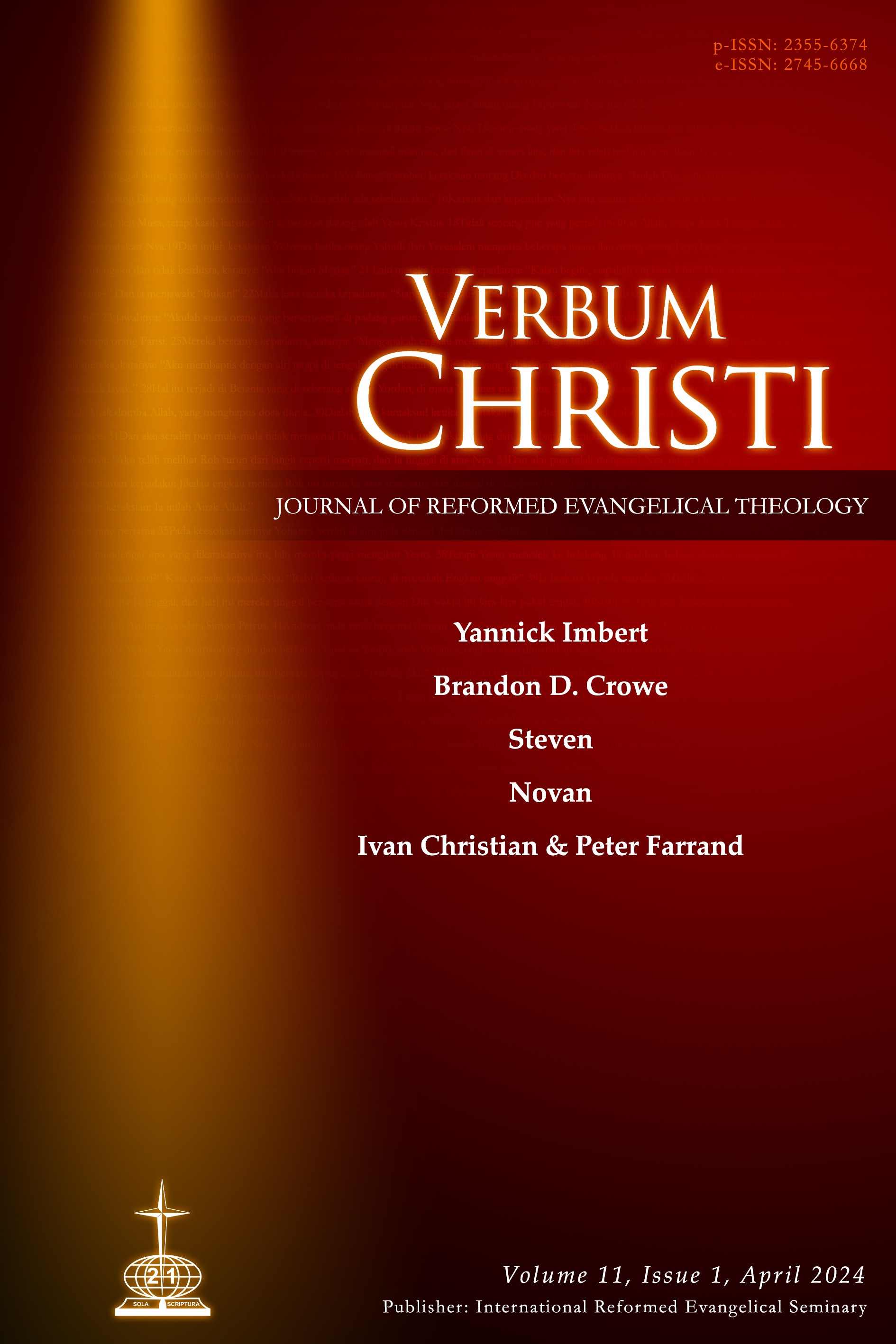Perspektif Teologi Tubuh dalam Memahami dan Menolong Depresi Remaja Penderita Depresi
DOI:
https://doi.org/10.51688/VC11.1.2024.art5Kata Kunci:
teologi tubuh, teologi praktika, remaja, penderita depresiAbstrak
Tingginya prevalensi depresi remaja di Indonesia patut mendapatkan perhatian yang serius. Remaja perlu dibantu untuk dapat mengatasi depresinya dengan baik sehingga mereka bisa mengalami transformasi dalam proses tersebut. Tulisan ini bertujuan untuk menjadikan perspektif teologi tubuh sebagai landasan normatif bagi orang Kristen di dalam memahami depresi remaja sehingga bisa memberikan bantuan yang tepat. Metodeyang digunakan dalam penelitian ini adalah metode teologi praktika yang diusung oleh Richard Osmer. Dengan metode tersebut, hasil penelitian menunjukkan bahwa depresi beserta berbagai gangguan yang mengikutinya bukanlah desain asali Allah bagi manusia yang adalah “embodied being”. Depresi yang dialami remaja pun mengganggu keseluruhan diri remaja, termasuk tubuhnya. Lebih lanjut, remaja berpotensi mengalami transformasi jika penanganan depresi dilakukan secara holistik, yakni dengan memperhatikan penanganan pada aspek materi dan nonmateri dari seorang remaja.
Unduhan
Referensi
Adams, Jay. “Competent to Counsel: An Interview with Jay Adams.” Ligonier, January 25, 2014. https://www.ligonier.org/learn/articles/competent-counsel-interview-jay-adams.
Adams, Jay E. Competent to Counsel: Introduction to Nouthetic Counseling. Grand Rapids: Zondervan, 2009. Kindle.
Allison, Gregg R. “Toward a Theology of Human Embodiment.” The Southern Baptist Journal of Theology 13, no. 2 (2009): 4–17.
American Psychiatric Association. Diagnostic and Statistical Manual of Mental Disorders: DSM-5. Fifth ed. Washington: American Psychiatric Publishing, 2013.
Frame, John M. Systematic Theology: An Introduction to Christian Belief. Phillipsburg: P&R Publishing, 2013.
Glannon, Walter. “Mind-Brain Dualism in Psychiatry: Ethical Implications.” Frontiers in Psychiatry 11 (2020): 1–4. https://doi.org/10.3389/fpsyt.2020.00085.
Hoekema, Anthony A. Manusia: Ciptaan Menurut Gambar Allah. Surabaya: Momentum, 2010.
Jones, Timothy Paul, and Michael S. Wilder. “Faith Development and Christian Formation.” In Christian Formation: Integrating Theology and Human Development, edited by James R. Estep and Jonathan H. Kim. Nashville: B&H Publishing Group, 2010.
Kapic, Kelly M. Embodied Hope: A Theological Meditation on Pain and Suffering. Downers Grove: InterVarsity Press, 2017.
Lara, Jessica A. “The God of Anxiety.” Journal of Psychology and Theology 46, no. 2 (2018): 110–15. https://doi.org/10.1177/0091647118767984.
Murray, David P. Christians Get Depressed Too: Hope and Help for Depressed People. Grand Rapids: Reformation Heritage Books, 2010. Kindle.
Nardi, B., G. Francesconi, M. Catena-Dell’Osso, and C. Bellantuono. “Adolescent Depression: Clinical Features and Therapeutic Strategies.” European Review for Medical and Pharmacological Sciences 17, no. 11 (2013): 1546–51.
Niu, Gengfeng, Jing He, Shanyan Lin, Xiaojun Sun, and Claudio Longobardi. “Cyberbullying Victimization and Adolescent Depression: The Mediating Role of Psychological Security and the Moderating Role of Growth Mindset.” International Journal of Environmental Research and Public Health 17, no. 12 (January 2020): 4368. https://doi.org/10.3390/ijerph17124368.
Osmer, Richard R. “Practical Theology: A Current International Perspective.” HTS Teologiese Studies/Theological Studies 67, no. 2 (2011): 1–7. https://doi.org/10.4102 /hts.v67i2.1058.
Parker, Gordon, and Kay Roy. “Adolescent Depression: A Review.” Australian & New Zealand Journal of Psychiatry 35, no. 5 (2001): 572–80. https://doi.org/10.1080/0004867010060504.
Pearcey, Nancy R. Love Thy Body: Answering Hard Questions about Life and Sexuality. Grand Rapids: Baker Books, 2018. Kindle.
Peltzer, Karl, and Supa Pengpid. “High Prevalence of Depressive Symptoms in a National Sample of Adults in Indonesia: Childhood Adversity, Sociodemographic Factors and Health Risk Behaviour.” Asian Journal of Psychiatry 33 (2018): 52–59. https://doi.org/10.1016/j.ajp.2018.03.017.
Rice, F., L. Riglin, T. Lomax, E. Souter, R. Potter, D.J. Smith, A.K. Thapar, and A. Thapar. “Adolescent and Adult Differences in Major Depression Symptom Profiles.” Journal of Affective Disorders 243 (2019): 175–81. https://doi.org/10.1016/j.jad.2018.09.015.
Rogers, Carl R. Client-Centered Therapy. London: Constable & Robinson Ltd., 2003. Kindle.
Santrock, John. Adolescence. 16th Ed. New York: McGraw-Hill Education, 2016.
Schäfer, Johanna Özlem, Eva Naumann, Emily Alexandra Holmes, Brunna Tuschen-Caffier, and Andrea Christiane Samson. “Emotion Regulation Strategies in Depressive and Anxiety Symptoms in Youth: A Meta-Analytic Review.” Journal of Youth and Adolescence 46, no. 2 (February 1, 2017): 261–76. https://doi.org/10.1007/s10964-016-0585-0.
Schleim, Stephan. “To Overcome Psychiatric Patients’ Mind–Brain Dualism, Reifying the Mind Won’t Help.” Frontiers in Psychiatry 11 (2020): 1–4. https://doi.org/10.3389/fpsyt.2020.00605.
Scrutton, Anastasia Philippa. “Two Christian Theologies of Depression: An Evaluation and Discussion of Clinical Implications.” Philosophy, Psychiatry, & Psychology 22, no. 4 (2015): 275–89. https://doi.org/10.1353/ppp.2015.0046.
Strachan, Owen. Reenchanting Humanity: A Theology of Mankind. Fearn: Mentor, 2019.
Sulistyorini, Wandansari, and Muslim Sabarisman. “Depresi: Suatu Tinjauan Psikologis.” Sosio Informa 3, no. 2 (2017): 153–64. https://doi.org/10.33007/inf.v3i2.939.
Welch, Edward T. Blame It on the Brain? Distinguishing Chemical Imbalances, Brain Disorders, and Disobedience. North Carolina: New Growth Press, 2011. Apple Books.
———. Depresi: Memandang Melampaui Kegelapan Yang Sulit Ditaklukkan. Translated by Junedy Lee and Jessy Siswanto. Jakarta: Penerbit Momentum, 2013.
WHO. “Adolescent Mental Health,” September 28, 2020. https://www.who.int/news-room/fact-sheets/detail/adolescent-mental-health.
WHO. “Depression,” January 30, 2020. https://www.who.int/news-room/fact-sheets/detail/depression.
WHO. “WHO | About the Global Burden of Disease (GBD) Project.” World Health Organization. Accessed November 18, 2020. https://www.who.int/healthinfo/global_burden_disease/about/en/.
Wright, Michelle F., Sebastian Wachs, and Bridgette D. Harper. “The Moderation of Empathy in the Longitudinal Association Between Witnessing Cyberbullying, Depression, and Anxiety.” Cyberpsychology: Journal of Psychosocial Research on Cyberspace 12, no. 4 (2018). https://doi.org/10.5817/CP2018-4-6.
Zhang, Baoshan, Xinwei Yan, Fengqing Zhao, and Fei Yuan. “The Relationship Between Perceived Stress and Adolescent Depression: The Roles of Social Support and Gender.” Social Indicators Research 123 (2014): 501–18. https://doi.org/10.1007/s11205-014-0739-y.
Unduhan
Diterbitkan
Cara Mengutip
Terbitan
Bagian
Lisensi
Artikel ini mengikuti ketentuan Creative Commons Attribution-NonCommercial 4.0 International License.
Hak Cipta (c) 2024 Verbum Christi: Jurnal Teologi Reformed Injili. Hak tersebut dipegang jurnal dengan sepengetahuan penulis.

